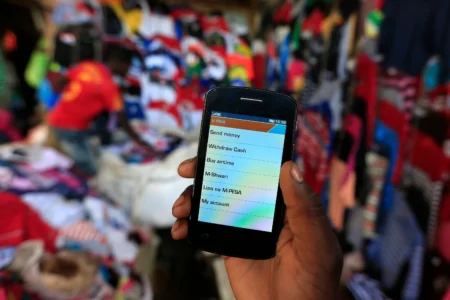Kenya’s eCommerce revenue is projected to hit $1.5 billion in 2021.
This follows an increase in the number of people who buy goods online. According to the latest statistics, 526 million Internet users are opting to buy goods at the click of a button.
As a result, digital platforms have been investing heavily in improving their digital infrastructure.
Patrick Ndegwa, the SEACOM East Africa Business Sales Lead, through a press release, has given an insight on Africa’s leading eCommerce platform and what developments can be expected regarding key policies and trends in online commerce today and in the future.
2021’s new trends
Ecommerce companies are putting considerable efforts into improving their digital infrastructure to meet increasing demands.
Mr. Ndegwa notes that transaction-management capabilities remain a priority, as more customers are purchasing on mobile devices and looking for credit options.

According to him, giving customers personalized, omnichannel experiences that also enable them to use their preferred payment platforms is no longer simply advantageous – but expected.
With the constraints of supply chains due to the pandemic, Mr. Ndegwa notes, logistics and order-fulfillment capabilities have also become a challenge for online platforms.
Delivery and transport costs not only make up a sizeable portion of eCommerce expenses, but many platforms have difficulties coping with shipping requirements.
For this reason, more customers are opting to shop on marketplaces rather than individual eCommerce stores.
Also Read: Mpesa Charges | mpesa registration process | Withdrawal Limits | How to become an agent?
Shoppable video ads on platforms such as TikTok and Instagram are creating a shift in the industry, and indicate a promising future for eCommerce on social media platforms.
Businesses that target young audiences have much to gain as they can influence buying decisions through direct engagement with a tech-savvy generation.
Lessons in perseverance and pivoting
Ecommerce not only presents Africans with the unique opportunity to access international markets, but it also spurs domestic economic activity.
Jumia, Africa’s biggest online retailer and the first African start-up to be listed on the New York stock exchange, boasted over one billion visits to their marketplace in 2019.
But to survive in today’s digital economy, companies need to keep evolving. Jumia turned its focus from retailing a vast inventory to enabling eCommerce for other African merchants.
In 2016, it downscaled its inventory and began investing in marketing and digital infrastructure, and allowed vendors to earn a commission from online sales.
This allowed it to expand into new markets and increase access to online retail infrastructure for smaller businesses.
Also Read: Covid Economics: Kenya’s navigation of debt relief
Similar to other disruptors like Uber, Airbnb, and WeWork, and many African start-ups, Jumia has still experienced eight years without profits.
American e-commerce giant Amazon took six years to become profitable! This has become almost the norm for some new digital disruptors, and it highlights the importance of having a long-term vision and investors who believe in you.
It would also not be possible for companies to remain in the red for so long while keeping investors happy without government policies and actions that create a stable and nurturing entrepreneurial environment.
The roadmap for African eCommerce
As many as 264 e-commerce start-ups were operating across Africa in 2017, and while e-commerce is certainly on the rise, the continent still faces challenges because of the lack of ICT and logistical infrastructure, customer reluctance (further exacerbated by the rise of cybercrime), low Internet penetration, and inadequate digital literacy.
Ecommerce legislation in Africa has failed to meet digital advances, as only 33 of Africa’s 54 nations have regulations for electronic transactions and only 25 have online consumer protection laws.
Consequently, the World Economic Forum and the International Trade Centre have laid down a Roadmap for Action for African e-commerce that will focus on fostering a wider ecosystem of digital technology to support e-commerce-based businesses.
This multi-faceted action plan includes re-evaluating key policies, expanding connectivity, upgrading logistics, improving electronic payment systems, and developing entrepreneurship for start-ups.
Also Read: Crypto mania: Fears behind cryptocurrencies
Considering that seven of the ten fastest-growing Internet populations in the world are in Africa, which is largely attributable to rapidly increasing mobile usage, there is no doubt that these challenges can be overcome.
Looking forward
The economic activity generated by local and cross-border e-commerce is accelerating Africa into a digital future.
African governments are even beginning to collect tax from this multi-billion-dollar opportunity, such as Kenya’s new Digital Service Tax that came into effect on January 1, 2021.
But if we truly want to see African e-commerce rise to a world-class marketplace, we need to provide more Africans with fast and reliable connectivity, and the education to thrive in digital environments.
The more we connect and trade with the rest of the world, the more the world will begin to see what Africa truly has to offer.
Future growth of e-commerce in Kenya

Although the uptake of e-commerce in Kenya has remained relatively low in comparison to more developed countries in the past, the expectation is that e-commerce in Kenya will further advance and develop its own model based on the characters and demand of the market.
Also Read: Widening broadband access can eliminate poverty in Africa
Kenya’s e-commerce ecosystem will be an interesting thing to keep an eye on in the coming years.
About SEACOM
SEACOM launched Africa’s first broadband submarine cable system along the continent’s eastern and Southern coasts in 2009.
Today SEACOM is the preferred partner for African businesses, network carriers, and service providers.
Through its ownership of Africa’s most extensive ICT data infrastructure – including multiple subsea cables and a resilient, continent-wide IP-MPLS network – SEACOM provides a full suite of flexible, scalable, and high-quality communications and cloud solutions that enable the growth of the continent’s economy.
SEACOM is privately owned and operated, allowing the company the agility to rapidly tailor-make and deploy new services, commercial models, and infrastructure in response to customer requirements. Without the red tape or hidden costs often prevalent in this industry.











